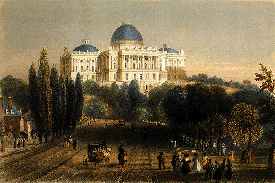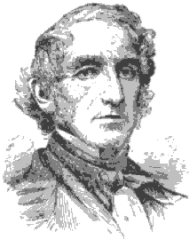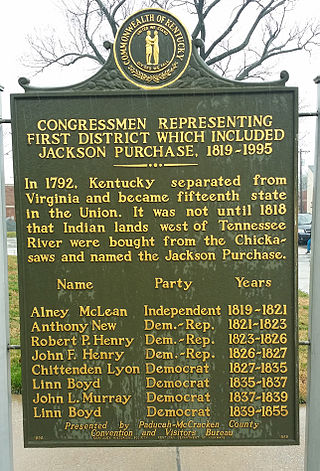Related Research Articles

The 18th United States Congress was a meeting of the legislative branch of the United States federal government, consisting of the United States Senate and the United States House of Representatives. It met in Washington, D.C., from March 4, 1823, to March 4, 1825, during the seventh and eighth years of James Monroe's presidency. The apportionment of seats in the House of Representatives was based on the 1820 United States census. Both chambers had a Democratic-Republican majority.

The 22nd United States Congress was a meeting of the legislative branch of the United States federal government, consisting of the United States Senate and the United States House of Representatives. It met in Washington, D.C. from March 4, 1831, to March 4, 1833, during the third and fourth years of Andrew Jackson's presidency. The apportionment of seats in the House of Representatives was based on the 1820 United States census. Both chambers had a Jacksonian majority.

The 23rd United States Congress was a meeting of the legislative branch of the United States federal government, consisting of the United States Senate and the United States House of Representatives. It met in Washington, D.C. from March 4, 1833, to March 4, 1835, during the fifth and sixth years of Andrew Jackson's presidency. The apportionment of seats in the House of Representatives was based on the 1830 United States census. The Senate had an Anti-Jacksonian or National Republican majority, and the House had a Jacksonian or Democratic majority.

The 28th United States Congress was a meeting of the legislative branch of the United States federal government, consisting of the United States Senate and the United States House of Representatives. It met in Washington, D.C., from March 4, 1843, to March 4, 1845, during the third and fourth years of John Tyler's presidency. The apportionment of seats in this House of Representatives was based on the 1840 United States census. The Senate had a Whig majority, and the House had a Democratic majority.

Robert McClelland was a US statesman, serving as U.S. Representative from Michigan, the ninth governor of Michigan, and United States Secretary of the Interior.

Ethan Allen Brown was a Democratic-Republican politician. He served as the seventh governor of Ohio.

Elbridge Gerry was an American lawyer, who served as a U.S. Congressman from Maine from 1849 to 1851.

Peter Force was an American politician, newspaper editor, printer, archivist, and early American historian. He was twice elected the twelfth Mayor of Washington D.C. During his lifetime he amassed an invaluable and vast collection of books, manuscripts, original maps and other archival material from statesmen, and American and British military officers of the American Revolution. Force's collection is considered to be among the most extensive. Force served in the Washington militia as a lieutenant during the War of 1812. Politically, he was a member of the Whig Party, and supporter of John Quincy Adams. He is mostly noted for editing and publishing a massive collection of historical documents, books and maps in several volumes involving the American colonies and the American Revolution which was ultimately purchased by the Library of Congress for a large sum. Force founded a political journal and other publications and was president of a premier national science society, and the Typographical Society which was largely charged with the task of communicating political affairs to the general public. Force served on the committee that approved the Geographical Department for the Library of Congress. During the international political unrest caused by the American Civil War, Force was sent to Europe by the Lincoln Administration to stabilize diplomatic relations with France and England.
Parmenio Adams was a businessman and politician from New York. He served as a member of the United States House of Representatives.
David Fullerton Robison was an Opposition Party member of the U.S. House of Representatives from Pennsylvania.

George Washington Hopkins was a nineteenth-century United States politician, diplomat, lawyer, judge and teacher.

Chittenden Lyon was an American businessman and politician from Kentucky. He was most notable for his service as a United States representative from 1827 to 1833.
Barker Burnell was a U.S. Representative from Massachusetts.
Benjamin F. Deming was an American merchant and politician. He served as a U.S. Representative from Vermont.
Isaac Wilson was an American politician from New York and Illinois.
The Columbian Institute for the Promotion of Arts and Sciences (1816–1838) was a literary and science institution in Washington, D.C., founded by Dr. Edward Cutbush (1772–1843), a naval surgeon. Thomas Law had earlier suggested of such a society "at the seat of government." It was the first "learned society" established in Washington and was organized on June 28, 1816, sixteen years after the city was occupied, and less than two years after the invasion by the British troops. The second article of its constitution states: "The Institute shall consist of mathematical, physical, moral and political sciences, general literature and fine arts."

The 1814 United States House of Representatives elections in New York were held from April 26 to 28, 1814, to elect 27 U.S. Representatives to represent the State of New York in the United States House of Representatives of the 14th United States Congress.

The 1818 United States House of Representatives elections in New York were held from April 28 to 30, 1818, to elect 27 U.S. Representatives to represent the State of New York in the United States House of Representatives of the 16th United States Congress.

The 1821 United States House of Representatives elections in New York were held from April 24 to 26, 1821, to elect 27 U.S. Representatives to represent the State of New York in the United States House of Representatives of the 17th United States Congress.

The 1824 United States House of Representatives elections in New York were held from November 1 to 3, 1824, to elect 34 U.S. Representatives to represent the State of New York in the United States House of Representatives of the 19th United States Congress.